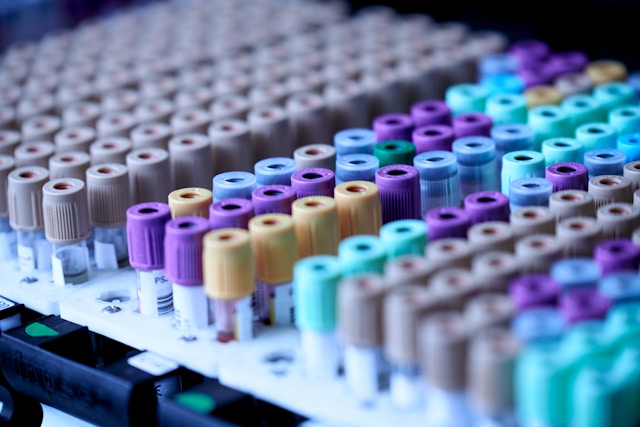Unlike conditions like high blood pressure or diabetes, there is no quick and easy test to diagnose Alzheimer’s disease accurately. It often takes several years and involves having a specialist review a patient’s medical history, perform a neurological exam, and run blood tests or other diagnostic tests to rule out other conditions — from hormonal imbalances to sleep issues — that could cause memory problems.
Only once everything else is ruled out will your doctor order a test to confirm Alzheimer’s pathology in the brain — beta-amyloid plaques and tau tangles. Typically, doctors will order an amyloid PET scan or lumbar puncture to confirm the presence of this pathology. These procedures often come with a waitlist, and patients might need to travel significant distances to a specialized center or clinic.
A new generation of blood tests are designed to screen for these Alzheimer’s biomarkers in the blood. Researchers and doctors believe these could eliminate the need for more complex, expensive, and harder-to-access tests like lumbar punctures and amyloid PET scans. This could speed up the diagnostic process, and help people get an accurate diagnosis sooner. That, in turn, can mean access to treatments designed for early-stage patients, eligibility for certain Alzheimer’s treatment clinical trials, and more time to plan ahead.
Several of these new tests have already hit the market. But, there’s still a lot of confusion surrounding them.
How do Alzheimer’s blood tests work?
There are currently two types of Alzheimer’s biomarker blood tests. The first screens for Alzheimer’s biomarkers in the blood. If they’re not detected, this helps a doctor rule out Alzheimer’s as an explanation for cognitive symptoms, while a positive test means more biomarker testing, either with another type of blood test, a lumbar puncture, or an amyloid PET scan.
The second kind of Alzheimer’s biomarker blood test can stand in for a lumbar puncture or amyloid PET scan. A positive test indicates that a person has a high likelihood of having Alzheimer’s pathology in the brain. A negative test indicates that there is a low likelihood of Alzheimer’s pathology. And an indeterminate test indicates that more testing is needed.
Importantly, no one test alone is sufficient to diagnose Alzheimer’s disease.
After your blood is drawn, it is sent to a laboratory for analysis. Within seven to 10 days, your doctor receives a readout of the results.
Can I get a blood test if I don’t have any symptoms?
Alzheimer’s biomarker blood testing for people without any cognitive symptoms aren’t yet available. It’s still unclear what represents a “high” level of blood biomarkers in a person who is cognitively healthy — and ambiguous test results can lead to unnecessary stress and anxiety. More data on testing is necessary to determine how accurate they are in people with no symptoms.
Are blood tests approved by the FDA?
Until 2024, diagnostic tests did not need FDA approval before hitting the market. As a result, none of the dozen or so blood tests on the market have had to prove to the FDA that the tests are accurate. That’s different now: Future tests will need to prove that they work before hitting the market.
Are blood tests covered by Medicare or insurance?
As of 2025, none of the currently available Alzheimer’s biomarker blood tests are covered by Medicare nor by private insurers. Depending on the test, the out-of-pocket costs range from a few hundred dollars to more than $1,400 — and again, the results can be very difficult to interpret without the guidance of a neurologist.
What tests are the most accurate?
Although these tools are relatively new, a few Alzheimer’s blood biomarkers, like pTau-217, are coming out on top, according to experts. Different companies use different laboratory techniques to measure proteins in the blood, and the tests are not yet standardized. So, it is impossible to compare two different tests directly. As a result, researchers are working on ways to standardize these tests, making it easier for both patient and doctor to decide which test is the best fit.













